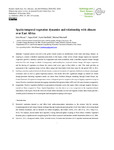Spatio-temporal vegetation dynamics and relationshipwithclimate over East Africa

View/
Date
2016Author
Musau, John
Patil, Sopan
Sheffield, Justin
Marshall, Michael
Metadata
Show full item recordAbstract
Vegetation plays a key role in the global climate system via modification of the water and energy balance. Its coupling to climate is therefore important particularly in the tropics, where severe climate change impacts are expected. 10Vegetation growth is mutually controlled by temperature and water availability while it modifies regional climate through latent heat fluxand changes in albedo. Consequently, understanding how projected climate change will impact vegetation and the forcing of vegetation on climate for variousland cover types in East Africa is vital. This study provides anassessment of the vegetation trends in East Africa using Leaf Area Index (LAI) time series for the period 1982 to 2011, lead/lag correlationanalysisbetween LAI and climate, a statistical estimation of vegetation feedback on climateusinglagged 15covariance ratiosas well as spatial regression analysis. Our results show fewsignificant changesin current LAI trends though persistent declining vegetationtrendsareshown from Southern Ethiopia extending through Central Kenya into Central Tanzania. Precipitation (temperature) exerts widespread positive (negative) forcing on lagging vegetation except in forests. Positive correlations between the lagging Antecedent Precipitation Index (API) and LAI were dominant compared to temperature. Positive vegetation feedback on precipitation dominates across the region while a stronger negative forcing is 20exerted on Tmin comparedto Tmax. Spatial dependence was also shown as a key component inthe vegetation-climate interactions in the region. Given the vital role of land surface dynamics on local and regional climate, these results provide a valuable point of reference for evaluatingthe land-atmosphere coupling in the region.
